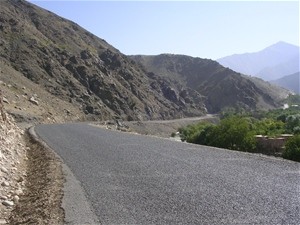
AFTER: The completion of the paved road in Panjshir Valley has reduced travel time from Kabul and provided people a chance to enjoy fresh mountain air and the Pan-jshir River on weekends.
USAID/Afghanistan
Paved road provides improved access to mountain area
1 SEPTEMBER 2006 | BAZARAK, PANJSHIR PROVINCE
The paved road running through the Panjshir is transforming the Panjshir Valley. “Panjshir used to be isolated like an island,” explains Tajadeen, a well known Panjshiri. “The people know about this road, and they are excited about it. We’re moving forward.”
The paved road running through the Panjshir is transforming the Panjshir Valley. “Panjshir used to be isolated like an island,” explains Tajadeen, a well known Panjshiri. “The people know about this road, and they are excited about it. We’re moving forward.”
Over the last several decades, the Panjshir Valley’s isolation was an essential component to the Valley’s distinction. It was the only place in Afghanistan that was never conquered by the Taliban or by the Russians, despite nine attempts.
The United States Agency for International Development (USAID) road project has paved nearly 48 kilometers of road through most major villages in the southern half of the Valley. It cuts through some of the most remote and difficult mountain terrain in the area.
The road has reduced travel time from Kabul to the Panjshir Provincial capital of Bazarak by half, from five hours to just less than two and half hours. People from Kabul have begun taking advantage of the shorter commute and can be seen enjoying the fresh mountain air and the Panjshir river on weekends.
The building of the road involved both the civilian and military components of the Provincial Rehabilitation Team (PRT). Not only is the US military’s road project complementary to the USAID project, but the military and civilians worked together to negotiating contentious issues such as water rights between elders and local leaders with the contractors.







Comment
Make a general inquiry or suggest an improvement.